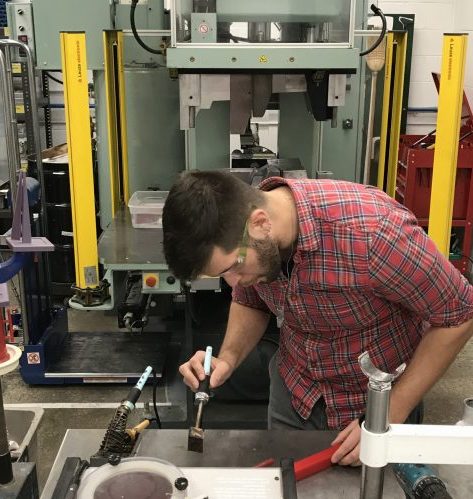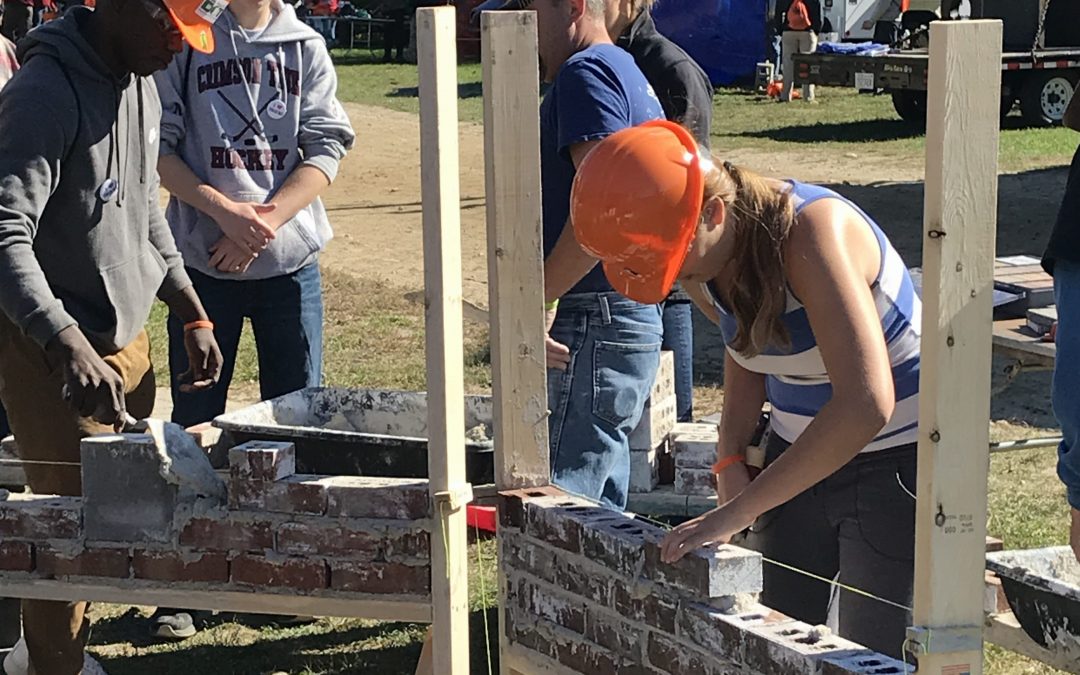
Dec 8, 2017 | Article
With NH currently facing a workforce shortage that is only expected to grow more serious in the next few years, the HR State Council of New Hampshire has become an increasingly important and vocal resource.
“Our focus is to support the HR community through legislative efforts, networking events and a variety of HR related initiatives, including workforce readiness,” said Tim Dabrieo, Director, HR State Council of New Hampshire.
In discussing the connection between HR professionals and workforce development issues, Dabrieo said they are the ones who “do the hiring.”
“They can’t find people,” he said. “We need to get HR professionals past today and thinking about three years from now.”
According to Robyn Chadwick, Director of Workforce Readiness, an initiative of the HR State Council, one way to assist the HR community is by helping schools better connect with industry. Career days, she said, represent one such resource.
“These are events where employers can come into schools and discuss what they do, what they need, and opportunities that exist right now at their company,” she said. “These events are increasingly important resources for schools and industry.”
Dabrieo agreed and said another area of focus for the HR State Council is to help secondary schools develop meaningful internships and work-based opportunities for students.
“We want to help employers take a more active role in helping develop curriculums that meet workforce needs—whether it is in healthcare, hospitality, manufacturing or other key industries,” he said.
Chadwick added, “It’s about career pathways and sparking that interest in students.”
In addition to helping connect industry leaders with educators, Chadwick said the HR State Council hosts numerous workforce readiness presentations for students.
“They run the full gamut—from how to do a handshake to resume writing, how to dress, set up a LinkedIn profile, create a proper email address or set up appropriate social media accounts,” she said. “We do mock interviews, too.”
In looking to the future, Chadwick said they the HR State Council is part of a broader HR-focused statewide initiative.
“We have educators, industry leaders, and other stakeholders working together and sharing resources to meet the workforce needs of today and tomorrow,” she said. “We can’t work in silos.”
An affiliate of the Society for Human Resource Management (SHRM), the HR Council is joined in this collaborative effort by Manchester Area Human Resource Association (MAHRA), Seacoast Human Resource Association (SHRA) and other SHRM Chapters across the state as well as BIA of NH, Reaching Higher NH, Stay, Work Play, NH Department of Business and Economic Affairs and the Department of Education among others.
As part of this group, which is currently divided into various task forces that will analyze and develop possible solutions to the workforce development gaps that face NH, Chadwick expressed optimism about a possible summit next summer.
“We want to bring teachers in and businesses together to help educate teachers on what really happens day to day inside their businesses what they do,” she said. “We need industry and educators working together to build curricula that align with career opportunities available to the incoming workforce.”
According to Chadwick, the need for collaborative, HR-focused solutions is not theoretical either.
“I’m the Human Resources Manager at Normandeau Associates, a national environmental consulting firm, and I see the need for these solutions today,” she said. “We need young professionals to stay here and keep working here.”
Dabrieo added, “We have talked to CEOs and presidents, and they are all facing hiring challenges…The role of the HR State Council is to help facilitate conversations between industry and educators. We don’t need to reinvent any wheels. We have resources. We just need to let the right people know about them.”
To learn more about the HR State Council of New Hampshire, visit https://nhstatecouncil.shrm.org.

Nov 27, 2017 | Article, Uncategorized
With unemployment rates at historic lows, every sector in industry is struggling with workforce development questions and challenges, which led to a “Conversation Café” this past summer at which numerous stakeholders weighed in on the issue.
The brainstorming session was spearheaded by the New Hampshire HR Council, the Manchester Area Human Resource Association (MAHRA) and Seacoast Human Resource Association in response to a directive from the Society for Human Resource Management (SHRM). In July of 2016 at the 2016 Democratic National Convention, SHRM President and CEO Henry G. “Hank” Jackson stated, “Two-thirds of HR professionals are having a tough time recruiting skilled workers. The skills shortage in the U.S. is a growing problem and will take innovative efforts of government, educational institutions and employers.”1
According to session attendee Doug Cullen, Manager of Career Services at Pinkerton Academy in Derry, there was strong CTE representation.
“We had 2 CTE center directors, 2 staff from Department of Education Bureau of Career Development, the Apprenticeship Bureau, and Community College system,” he said.
The purpose behind the “conversation” was to initially explore how to get a better trained workforce into industry and the appropriate kinds of training and avenues to make that happen in the short-term. As a result of the discussions that took place, five key concepts were raised that the group will explore as the basis for future workforce development and training solutions.
Best practices in experiential and work-based learning opportunities.
How employers can step up (possibly be involved in) designing curriculum to meet industry needs.
Understanding Department of Labor requirements for internships.
Highlighting effective career services possible between schools and businesses.
Identifying training partnerships with businesses.
The group discussions were facilitated by BIANH, Bureau of Career Development, one of the CTE directors, and Reaching Higher NH.
“One thing we are looking at very closely is how to design training mechanisms—mini-videos, off-the-shelf curriculums or other interventions—that can be customized to suit specific needs in industry,” said Cullen, who also served as facilitator.
In furtherance of this effort, a focused task force was formed in October to drill down further into possible solutions with the objective to bridge the gaps between a future workforce pipeline and people to fill it. Cullen said this HR-focused group involves other related efforts, including the Career Pathways State Steering Committee, 2025 Accelerator, 65 x 25, Sector Partnerships Initiative and others.
“We are all facing the same issue, so it makes sense to get us all together in the same room at the same time,” he said.
As for why he became involved in this initiative, Cullen said he wanted to proactively work to solve these larger employment and economic development challenges with many of the people he and others are most likely to encounter when attempting to bridge these gaps.
“I’m not just talking to the engineers, manufacturers or construction foreman, I’m talking with someone from HR,” he said. “We need to get out in front of this as we’re already fighting such significant employment challenges.”
Nov 20, 2017 | Article, Automotive
Nicholas Raynes of Exeter received a $1,000 scholarship from the New Hampshire Automotive Education Foundation (NHAEF). He was given an additional $1,500 scholarship last year. Nick is in his second year at Nashua Community College, where he is pursuing an associate degree in automotive technology. In addition to his studies, Nick is working in the service department at AutoFair Hyundai in Manchester.
He graduated from Exeter High School in June 2016, taking automotive technology courses at the Seacoast School of Technology in Exeter. An auto tech career is high tech with high wages and low tuition at NH’s Community Colleges. Techs in NH make $58,000 on average and there are over 400 jobs that need to be filled. NH’s community colleges offer 2-year associates degrees in auto tech for roughly $20,000 including the cost of tools. Scholarships like NHADA’s lower that cost even more. Auto tech students can leave school with no or low debt if they take advantage of paid internships, as well as summer full time employment.
The NHAEF has awarded $315,500 in scholarships since its inception. It is a not-for- profit affiliate of the New Hampshire Automobile Dealers Association (NHADA), a statewide trade association with a staff of 31 professionals, representing approximately 500 businesses in the motor vehicle industry with over 14,000 employees. NHADA members run the entire gamut of the motor vehicle industry, including new-car and -truck dealers; motorcycle and recreational vehicle dealers; farm, power, and construction equipment dealers; used-vehicle dealers and recyclers; repair shops, body shops, and parts stores; and other companies that have ties with the motor vehicle industry. Annual retail sales for all members are in excess of $3.8 billion and account for over 24 percent of all retail sales in New Hampshire. More information can be found at www.nhada.com. NHADA also includes affiliate organizations: the NHADA Workers’ Compensation Trust; NHAD Services, Inc., and NHAD Insurance Trust.

Nov 10, 2017 | Article
A 4-year college or university is not the only pathway to a successful career, which is something Joe Peterson wishes he knew when he graduated high school in 2008. Acknowledging he felt pressure to attend post-secondary school of some kind while also admitting he had no concrete plan for his future, he enrolled in a community college and earned an associate’s degree in software development. His “plan,” however, did not go according to plan.
“I worked three jobs while going to school and my degree turned out to not be worth the weight of the paper it was printed on,” he said.
For Peterson, his inability to formulate a plan for his future had nothing to do with a lack of ambition.
“I was a run of the mill straight ‘C,’ student, but it was a reflection of my interest in what was happening in the classroom rather than my intelligence,” he said.
In 2011, though, he heard about opportunities at Hitchiner Manufacturing Co., Inc.
“I got a job in the foundry and could afford to work one job,” he said. “I felt I could get put my head down and work, get stable and then reevaluate things at a later date.”
In 2014, Peterson was approached by Hitchiner to enter its “Path to Success – Hitchiner Succession Leadership Program.” Developed in 2013 by senior leadership at the company, the program provides a path for hourly employees to become a quality, product, process or manufacturing engineer without the need to obtain a bachelor’s degree in engineering.
“I took classes at Hitchiner facilitated by Keene State College and and classes at Manchester Community College,” said Peterson. “Hitchiner covered it, too. I think the only thing I had to pay for out of pocket was one book.”
After two years, he said he was offered “a step up” at the company, which directly resulted from his participation in the program. In May of this year, he was offered and accepted a salaried position as an associate engineer at the company.
“It’s been a great experience,” he said.
According to Tim Sullivan, Vice President, Corporate Affairs and Services at Hitchiner, Path to Success addresses a core need at the company and in the manufacturing industry itself.
“Unemployment at 2.5 % will be sustained through 2020, and we know we need to add to our workforce—maybe a couple hundred new employees,” he said. “The question is how do we attract new people?”
The answer, according to Sullivan, includes multiple “value propositions.”
“We offer a free health care clinic on-site, so that along with Path to Success and tuition assistance are our ways of providing alternatives to high school graduates,” he said. “Come to Hitchiner, earn a good wage, learn a trade and have zero college debt…Other companies in our industry are doing the same thing.”
On November 28, Peterson will talk to students at ConVal Regional High School about his experience at Hitchiner.
“My takeaway is that there does not need to be a rush for students to go into a four-year school when you turn 18,” he said. “Had I been introduced to a manufacturing environment when I was younger, I would have focused on that.”

Oct 31, 2017 | Article
As automation and artificial intelligence continue to change the way all industries operate, students planning for college and careers face a unique challenge – securing educational opportunities that will serve them in a world where employment needs change faster than the time it takes to earn a post-secondary degree or job training. The Ready in the 603 video series, produced by Reaching Higher NH (RHNH), highlights how New Hampshire students are taking advantage of innovative opportunities to prepare themselves for college, careers, and service after graduation, and provides insight into this challenge.
The series is the result of hundreds of student interviews RHNH conducted across the state last spring to learn about the impact of programs such as Career Technical Education (CTE), Extended Learning Opportunities (ELO), Running Start, and others. Reaching Higher NH took what they heard and identified the common threads to produce the series.
The series is featured as part of their Ready in the 603 contest, www.reachinghighernh.org/readyingthe603/, where viewers are encouraged to vote for the video that they find most compelling and share what programs they would like to see more in their schools. Participation in the project helps Reaching Higher NH continue their work in telling the stories in NH public education from the student perspective.
“Many of the stories we heard were so inspiring, we found ourselves watching the videos over and over,” said Robin deAlmeida, Marketing Communications Director, Reaching Higher NH. “It was an amazing opportunity to listen to, and learn from, the young people we are working daily to support.”
The videos bring to light important opportunities for students in NH. Families should know how these programs can take learning to the next level. In some cases, high school students earn up to 20 college credits and professional certifications through programs like those featured in the video series.
Many of the students interviewed shed light on the evolution of CTE. What was once exclusively a vocational program now covers high demand careers such as engineering, biotech, and business.
“These are rigorous academic models where students apply what they learn in the field,” said deAlmedia. “Post-secondary education is expensive and highly competitive–we all know this. Having high school students in the field before graduation empowers them to make informed decisions about their future, allows them to establish mentors, and provides them with a competitive advantage in pursing whatever they want after high school. These programs are for every student, from the ones that excel in the classroom to the ones that learn better in a hands-on environment. These are deep and meaningful learning experiences.”
Reaching Higher NH’s mission is to foster support for high quality public education, giving all New Hampshire children the opportunity to prepare for college, for immediate careers, and for the challenges and opportunities of life in 21st Century New Hampshire. Learn more at www.reachinghighernh.org

Oct 24, 2017 | Article, Building & Construction Trades
On Thursday, October 26, hundreds of business owners, architects, contractors and others are expected to attend the Annual “Excellence in Construction” Awards, presented by the Associated Builders and Contractors, New Hampshire/Vermont Chapter (ABCNHVT).
At the event in which there are seats for 50 teachers and students at no charge, ABCNHVT’s Jennifer Landon said the purpose behind it is threefold.
“It’s an opportunity to promote our industry, improve our image, and communicate to the public about the importance of the construction industry and the value construction professionals provide to our economy and all of society,” she said.
For ABCNHVT’s new president Josh Reap, the event highlights construction industry needs.
“The mounting shortage of skilled construction workers has acted as a drag on the ability to get things done,” he said. “Every contractor I talk to says their biggest problem is finding people and that is backed up by the statistic that we have the nation’s fourth lowest construction-related unemployment rate. The average age of a New Hampshire construction worker is 45, so anyone entering the industry now will find years of stable employment.”
In discussing the role of ABCNHVT, he said a big part of what they do is forge partnerships with local schools and industry allies “to get the word out” about the need for people in the construction industry today. He said part of their job as an agency is to create opportunities for career professionals to tell their story to students about what it is like in construction and how it has provided both opportunity and a pathwnay to a good life.
“There are presently 500,000 jobs that are ready to be filled right now in the American construction industry,” he added.
In hosting the event on October 26, Reap said it is an opportunity for them to recognize the outstanding projects of the year among ABCNHVT membership. He said the event also serves to help invited high school students and CTE professionals learn more about careers in construction.
“We will have a special feature on Careers in Construction to raise awareness of the opportunities that exist for those individuals that want to work with their hands and minds,” he explained. “As the leading representative of the industry, ABC works to promote careers in construction with a focus on building the individual to reach their fullest potential.”
In looking ahead, Reap said he hopes the work performed by ABC as a whole can help to disentangle pervasive myths about the construction industry.
According to Reap, there are many myths and misinformation that surround the construction industry that prevent many students from pursuing a career in it.
“Construction is a pathway to the middle class that doesn’t carry mountains of student loan debt,” he said. “Today’s construction worker is highly skilled and has the potential to earn a great paycheck.”
He cited for the average yearly salary for a Pipefitter in New Hampshire as one example.
“The annual average salary is around $61,000—and the training is often paid for by the employer, who puts the student through a craft course or apprenticeship program,” he said. “Construction today involves a lot of cutting edge technology and math, which is a far cry from the image of a dirty low wage job people sometimes still think when they thought of construction.”
To learn more about the Associated Builders and Contractors, New Hampshire/Vermont, visit www.abcnhvt.org.





